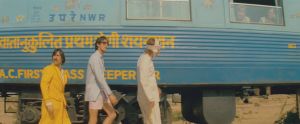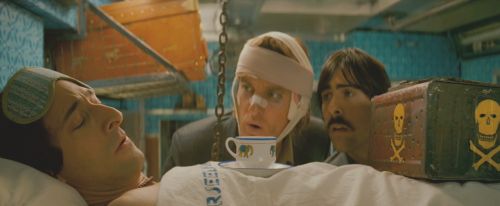 The Darjeeling Limited (Wes Anderson, 2007)
The Darjeeling Limited (Wes Anderson, 2007)
Wes Anderson has a hugely loyal following, but I’ve never quite been fully on board. For example, The Royal Tenenbaums – anecdotally his most popular movie – inspired enormous devotion in many who saw it. Yet as much as I could admire Anderson’s wonderful visual style and understated humour, the characters left me distant and I didn’t feel that the whole thing amounted to much. (I thought the television show Arrested Development, which riffs on many of the same themes as Tenenbaums and was probably inspired by it, was richer and more interesting). However, his new film, The Darjeeling Limited, has come much closer to winning me over. A mix of comedy, drama and travelogue, it takes us on a train journey across India with three brothers: the confident and overbearing Francis (Owen Wilson); the withdrawn writer Jack (Jason Schwartzman); and Peter (Adrien Brody), who is still deeply in grief about the death of their father. Francis wants to take them all to find their mother, who is living in rural India, but complex layers of mistrust and loyalties run between the three siblings.
I was worried at the film’s opening: it starts with a short, Hotel Chevalier, featuring an encounter in a Paris hotel room between Jack and his estranged girlfriend (Natalie Portman, in a role that exists for only fleeting seconds in the feature itself). There are nice character touches in the short, such as Jack’s use of Peter Sarstedt’s “Where Do You Go to My Lovely” as mood music, but the overall tone is, frankly, pretentious: full of loaded pauses and meaningful silences. Anderson favours a certain inscrutability in his characters, and in a feature form there’s time to tease that out and break it down, but in this short it just means that too much is left unsaid to actually ascribe any meaning to the experience.
Fortunately, however, the feature film itself is considerably more lively, right from the opening shots (which feature an incongruous cameo from Bill Murray). With the brothers reunited on the train, the dialogue becomes sharp and the characters involving. The failure of the prologue short turns out to itself be revealing of character: Jack seemed remote because he wasn’t with his siblings. The brothers only really seem at ease when interacting with each other; even the extroverted Francis is incapable of relating to his assistant, who is travelling on the train with him but is banished to another cabin. One of the film’s best comic devices is similarly telling, with the brothers constantly entrusting secrets to each other, only for those confidences to be broken at the first opportinity. This is a family in which mutual mistrust and betrayal has become a form of communication.
This kind of fractured family relationship recalls Tenenbaums, but the journey across India gives the film a sense of movement and progression that the earlier film lacked. Anderson also really reaps the rewards of his close collaboration with his actors. Schwartzman (along with his cousin Roman Coppola) is listed as one of the screenwriters here, and Wilson collaborated with Anderson on his first three features. This dual-purposing of actors and screenwriters, along with the reuse of certain actors across his five features, gives a hint of how closely Anderson is working with his cast; you wonder whether the Writers Guild-approved screenwriting credits are really catching the nuances of the creative process Anderson is using. Owen Wilson, in particular, really owns his character here; Wilson has a limited range as an actor (to put it mildly) but Anderson shows how Wilson’s broad comic style can work as a foil to performances that are on a quite different register. Here those counterpoints are provided by Brody and Schwarzman, who provide deadpan variations on similar personality types. The performances throughout seem natural and spontaneous – whether through genuine spontaneity or intensive rehearsal that provides the artful illusion of it.
What’s really interesting and impressive about Anderson’s style is the way he combines those freewheeling and (seemingly) semi-improvised performances with a visual style that obviously requires rigid planning. An actor-oriented style usually concentrates on simple camera movements and loose blocking to give the actors as much freedom as possible, but Anderson’s style is much more tightly controlled. He likes to arrange his actors in highly formal tableaux, and moves his camera from shot to shot in tricky ways (he particularly loves sideways tracking shots between set-ups, and also throws in some whip pans from actor to actor). That he still manages to keep everything so focussed on the performances and not come across as a technophile is the most interesting thing about his films.
That mix of naturalism and formality at a stylistic level complements perfectly the world Anderson creates, which is populated by characters with very recognisable frailties which are then heightened to emphasise their eccentricities. That aspect of comic exaggeration is, I think, why Anderson’s characters are sometimes so distancing; we see such over-the-top characterisation in commercial cinema all the time, but there it’s usually paired with traditional narratives. Anderson puts these extreme types into art-film narratives where the character’s motivations are less straightforward. It’s a risky strategy, because when the character’s motives for the actions are unclear, we don’t have the psychological realism that would explain their motivation and give the audience something to relate to. This, I think, is why Anderson continues to receive criticism that his characters behave in infuriating and arbitrary ways.
I can recognise that criticism, but the advantage when his approach is working – as I felt it was here – is that the experience is exciting and memorable. The Darjeeling Limited is a very rewarding journey.
